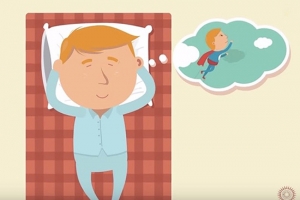Instant Inductions: Why Surprise and Shock Put You into Hypnosis
We're sent into mini-trances all the time when unexpected things happen – here's why
 Instant trance is a natural response to surprise or shock
Instant trance is a natural response to surprise or shockWhat comes to mind when you think of hypnosis? Comfort? Calm? Deep relaxation and rest? This is the way it is usually done. But there is another kind of hypnosis. One that happens to every one of us in everyday life.
Shock and surprise can and do create instant and profound hypnosis.
To understand how this works is to understand yourself and other people - and life itself - more fully.
When I say 'shock', I of course mean the psychological, not the electrical, kind. Mind you, being electrocuted can be pretty emotionally shocking too!
Now we all talk a lot about shock, but what exactly is it? And why should it cause our consciousness to shift, sometimes quite profoundly?
Expectations shape experience
We live our lives to a large extent though expectations, which can make us depressed (when we expect only bad things) or hopeful. It takes a calm mind to relax expectations to see what is, not what might or could be.
But most of our expectations exist on the subconscious level.
If you were to drop an apple, you would only become conscious of the strong expectation that it was going to fall downwards if it didn't!
If it continued to float by your hand or began to travel upwards, your expectation would be shattered. And the result of such a confounded strong expectation would be psychological shock.
You experience shock whenever any strong expectation is sharply confounded. You don't think about your expectation that you will be able to see when you open your eyes, that a friend will be friendly, or that you will remain unmugged on your way to work. Yet these expectations form a large part of how you negotiate the world and how you organize your consciousness.
To take offence is to be shocked because we expect (fairly or otherwise) something from others and they give us something else.
But perhaps the deepest kind of shock occurs when we experience a profound physical shift.
Here's a case in point.
When I was 10 I lived in a world devoid of parental paranoia and portable devices. I loved to climb trees.
My pals and I would play dare-devilishly in a nearby wood, where there was a particular tree overhanging a drop of about eight feet. We would dive out from a mini cliff to grab the branches and swing and hang suspended above the drop.
One time I dived out to a branch but my hands slipped. The force of my leap drove my legs upwards, and I did a full feet-first backflip in mid air.
My friends could see what was happening to me physically, and I have to say it must have looked pretty cool, because I did a full rotation and landed unharmed on my feet. What they couldn't know is what was happening to my consciousness during that split second of air time.
The secret of instant hypnosis
Yes, you've guessed it, everything went into slow motion, I felt absolutely calm and relaxed; my mind felt wide open. There was no expectation any more. There was no hope or fear. Hope and fear are future-oriented states, but in this moment only a kind of eternal now-state of consciousness existed. I had discovered how to truly live in the moment, thanks to sudden shock.
A split second to my friends felt like eternity to me.
When I landed, it was like coming out of a dream or awakening from a hypnotic trance. (Not that I understood the hypnotic nature of this kind of experience back then.) I felt like I'd been someplace else. Only afterwards did my heart rate speed up. But by that time I was busy trying to look totally unruffled!
Of course, I wasn't unique in my experience of this fast-track entry to a wide-awake hypnotic state. Countless people have reported time distortion, as well as visual and auditory alterations, during sudden shock experiences. And many people have been programmed hypnotically during such times too, though they don't realize it.
People don't tend to think of this type of experience as instant shock hypnosis, but that is precisely what it is.
Maybe you can recall times of shock in which your consciousness, for a timeless moment, became wide open because for that split second your expectations, even unconscious ones, had nothing to attach to.
There was no precedent, no pattern to which your mind could connect. Time may have felt like it went into slow-mo. Perhaps reality felt suspended, dreamlike. In times like this a sense of unreality flashes though existence.
So why do I link this kind of shock to a fast-track, naturally occurring hypnotic induction?
Watch an example of how to use surprise conversationally in a therapy session
Life is but a dream - especially during shock
"Everything was like slow motion! It felt unreal, like a dream!"
People who experience shock or even surprise very commonly describe their experience as having a dreamlike quality. Though for many, it would more accurately be described as a nightmare.
The hypnotic mind and the dreaming mind are closely connected, it seems. I describe here why and how the REM (rapid eye movement) state is accessed during wakefulness in hypnotic trance.
Before we enter hypnosis, before we start dreaming, and also as we enter shock, an electrical spike fires in the brain, from the brainstem all the way up to the neocortex. This is known as the PGO spike.
Stage hypnotists instigate activation of the PGO spike when they unexpectedly tip a volunteer backwards and then command them to "Sleep!" My PGO spike would have fired as I floated through the air all those years ago, but it's also fired many times since - every time I've entered dream sleep or hypnosis, as well as at other times I've been shocked.
The REM state, when accessed during wakefulness, can be used to emotionally program us - for better or for worse.
The rapid eye movement - or REM - state is usually connected to dreaming, and is so called because during REM your eyeballs flicker from side to side. But REM can also occur when we are awake.
In fact, even before we're born we experience the REM state - and it's through this state that instincts are laid down in the womb.1 So REM has to do with dreaming but also, it seems, with instinctual programming.
During hypnosis, when we enter the REM state (albeit it not through the state of sleep), new ways of responding to life can be programmed or assimilated into us.
This can happen in ways that work against us, as when we enter wide-awake REM during a trauma and thereafter experience horrible 'post-hypnotic suggestions' every time we encounter a trigger that hypnotically regresses us back to that original experience (flashbacks).
Or it can happen in ways that help us, as when purposefully used hypnosis allows us to overcome phobias, post traumatic stress disorder (PTSD), or depression.
The reason shock often feels dreamlike and unreal is because this state of mind is actually related to dreaming and hypnosis.
But how might a clinical hypnotherapist utilize this quick-fire way of eliciting hypnosis with clients?
When shock can help us
A shock properly applied can help us break free of brittle, rigid, self-defeating mindsets. This is why psychotherapists and genuine spiritual teachers2 apply psychological shocks now and then - to help add a little more freedom to a mind that runs only in tight, 'mechanical' circles.
Many therapists use purposefully confusional language to 'tie up' the conscious mind so that the unconscious mind has the space to learn free of the rigidities and automatic but limiting scepticism of the conscious mind.
Puns, non sequiturs, and jokes can all be applied therapeutically to cause mini awakenings in the mind. These small confusions can amount to a kind of hypnotic communication. This kind of purposeful surprise generation can be done during everyday conversation or through the more usual and recognizable hypnotic trance.
But some therapists have gone even further to produce immediate hypnosis and instantaneous change.
The instant hypnotic curative
Legendary psychiatrist, MD, and hypnotist Dr Milton Erickson was once asked to treat a teenage girl who was convinced that her (perfectly normal-sized) feet were too big and ugly and had stopped going out at all. The girl would not discuss her feet with anyone, felt she would never get a boyfriend because of them, and knew nothing of her mother's intention of enlisting Dr Erickson to help her.
Erickson, being a medical doctor as well as the world's most celebrated hypnotherapist, engineered a home visit to the girl's sick mother. He rather brusquely asked the girl to help him in attending to her mother. He had noticed her feet were perfectly normal.
Suddenly he 'accidentally on purpose' stepped back on the young woman's foot. She yelped and, as she recoiled in shock, he said loudly:
"If only you could grow those feet big enough for a man to see!"
In a single act, he focused her attention (with the pain and shock of having her foot trodden on), reframed her idea of her feet being too large, and loosened up her ideas of her own unattractiveness to men by using the word "man" as part of the reframe.
She hadn't known she had received shock therapy, but her mother later reported to Erickson that her daughter had gone back to school, was going out socially, was much happier, and no longer talked about her feet!
There are, of course, many other examples of Milton Erickson using shock hypnosis to help his patients, as well as the more usual progressive relaxation and inner absorption hypnotic processes.3
Know hypnosis, know yourself
To understand yourself and other people it's vital to know how the hypnotic brain operates in us all.
Shock is hypnotic, connected to the REM state - hence the dreamlike quality that often accompanies shock - via the PGO spike firing in the brain.
Confusional language (which has to make sense but be hard for the conscious mind to untangle) is a common way hypnotherapists make use of this natural aspect of shock, but it can be used with even greater impact, as evidenced by the work of Milton Erickson and others.
Emergencies naturally hypnotize us, and people who want to manipulate you, such as bullies, unknowingly make use of the hypnotic nature of shock.
This knowledge should make certain aspects of life clearer to you, and protect you against those who would use shock hypnosis against you.
Little did I know when I swung off that branch all those years ago that I had entered a profound and sudden shift into (mid air) hypnosis.
To learn more about hypnosis, see our free online self-hypnosis course.
References
- https://www.sciencedirect.com/science/article/pii/S1087079202902431
- See Learning How to Learn, by Idries Shah
- See Uncommon Therapy: The Psychiatric Techniques of Milton H. Erickson, M.D., by Jay Hayley






